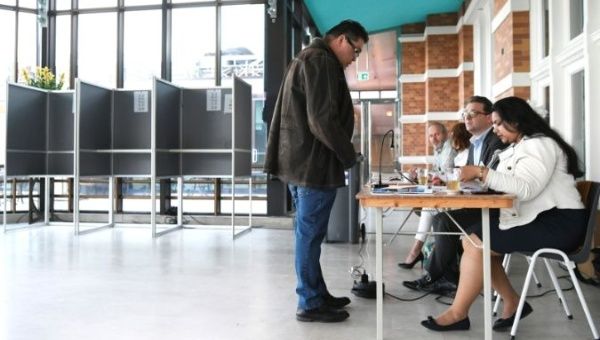
Election staff process a voter arriving at a polling place for the European elections, at the Kurhaus in Scheveningen, Netherlands. Photo courtesy of Telesur
BRUSSELS,May 24 (NNN-TELESUR) – Dutch and British voters started voting Thursday for the European Parliament. From May 23 to 26, the European Union’s (EU) 28 member states will choose a total of 751 Members of the European Parliament (MEPs).
Polls opened first in the Netherlands, and half an hour later the election began across the U.K., as both nations kicked off the four-day election process, marking the ninth occasion since the first direct elections in 1979. The current number of MEPs is 751, although those seats are set to drop to 705 when the U.K. leaves the bloc. The Dutch currently get 26 MEPs, a number that will rise to 29 after Brexit.
This year’s elections will be closely watched as Eurosceptic and far-right parties poise themselves as new and powerful players. The Dutch vote is the first test of the appeal the far-right and nationalist, as well as Eurosceptic, parties running in elections across the bloc. Based on those results alone, the outcome may offer some relief to pro-EU supporters.
In an unexpected win, the Netherlands’ Labour party won most Dutch votes Thursday, according to an exit poll, easily beating the nationalist Eurosceptic Forum for Democracy party of populist Thierry Baudet, who had been topping the polls.
“I hope that this gives a tailwind for a lot of other social democrats in Europe,” European Commissioner Frans Timmermans, Labour’s lead candidate, said in reaction to the poll result.
Dutch Prime Minister Mark Rutte’s conservative VVD party finished second, loosely followed by Forum for Democracy, which had been neck and neck in polls with the VVD. But the biggest upset was the anti-Islam far-right Party for Freedom (PVV) founded by Geert Wilders.
All voting intention polls were giving Wilders’ PVV about 10 percent of the vote, which would have meant similar results as 2014 — four seats in the EU Parliament. However, according to Ipsos, Wilders’ party merely got four percent, a decade low, which means only one MEP for the Dutch far-right.
Meanwhile, the British also took to the polls Thursday. U.K. Labour leader Jeremy Corbyn warned in the morning that “the far-right is on the rise,” adding that “the actions we take now will have huge consequences for our future.”
Although no exit polls are expected Thursday night from the U.K. voting, many prior polls and the latest YouGov poll Wednesday placed Nigel Farage’s recently created (Feb. 2019) Eurosceptic Brexit party, as the big winner with about 37 percent.
The pollster predicted that Liberal Democrats will come in second with 19 percent, Corbyn’s Labour with 13, closely followed by the Green party with 12 and the Conservatives of Prime Minister Theresa May with a mere seven percent. From these figures, the U.K. will get 73 MEPs. Yet the government said that if Brexit occurs by the end of June, they will not take up their seats.
Latvia, Malta, and Slovakia will vote on May 25, while the Czech Republic will have two days to go to ballots on May 24 and 25. The remaining countries will vote on May 26, as final results from all 28 EU nations will be published after voting ends late Sunday.




